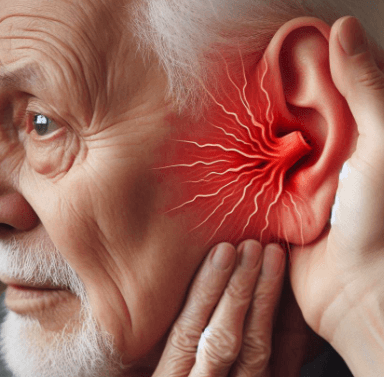Before diving into the nitty-gritty of how hearing loss connects to dementia, it’s crucial to get a handle on what hearing loss is all about.
Hearing loss isn’t just about cranking up the TV volume or asking people to repeat themselves—it’s a bit more complex than that.
First off, let’s define hearing loss. There are three main types: conductive, sensorineural, and mixed.
Conductive hearing loss happens when there’s a problem conducting sound waves through the outer ear, tympanic membrane (eardrum), or middle ear. Sensorineural hearing loss involves damage to the inner ear’s cochlea or the nerve pathways from the inner ear to the brain. Mixed hearing loss is a combo of both.
Common causes can be as varied as a rock band’s playlist. Aging tops the list—many folks over 65 experience some degree of hearing loss. Next, there’s exposure to loud noises, from concerts to construction sites—a lifetime of loud sounds can catch up with those ears. Genetics also play a role, meaning if it runs in the family, you might be at higher risk too. And let’s not forget infections; things like repeated ear infections can damage hearing over time.
This kind of hearing damage can put the brakes on daily activities. Imagine not catching the punchline of a joke or having to isolate because you can’t follow conversations easily. It can be a lonely ride without proper hearing.
On the numbers side, statistics paint a clear picture.
According to the National Institute on Deafness and Other Communication Disorders (NIDCD), about 15% of American adults (37.5 million) aged 18 and over report some trouble hearing. The prevalence increases significantly with age—nearly one in three people between 65 and 74 experience hearing loss, and nearly half of those 75 and older have difficulty hearing.
So it’s a widespread issue and not something that just happens to ‘someone else.’
How Hearing Loss is Linked to Dementia?
Dementia might sound like a heavy topic, but understanding it can shed light on its connection to hearing loss.

Dementia is an umbrella term for a range of cognitive impairments affecting memory, thinking, and social abilities. Alzheimer’s disease is the most common type, but others include vascular dementia, Lewy body dementia, and frontotemporal disorders.
Now, what’s the buzz about the relationship between hearing loss and dementia? Research from places like Johns Hopkins Medicine has uncovered some pretty eye-opening connections.
Studies show that hearing loss can increase the risk of dementia. For instance, a long-term study from Johns Hopkins found that mild hearing loss doubled the risk of dementia. Moderate hearing loss tripled the risk, and severe hearing loss made it five times more likely.
The big question: why?
There are a couple of theories floating around. One is the cognitive load theory. When hearing diminishes, the brain uses more resources to process sound, leaving fewer resources for other tasks like memory and thinking. It’s like having an old computer with too many programs running—it slows everything down.
Another hypothesis is the social engagement angle. Hearing loss can lead to social isolation because it’s tougher to engage in conversations and social activities. Being socially active is crucial for keeping the brain sharp—so less social interaction can contribute to cognitive decline.
High-authority sources back up these points. The Lancet Commission published a report identifying hearing loss as one of 12 modifiable risk factors for dementia. This means addressing hearing loss early could help reduce dementia risk. It’s a clear sign that taking care of our hearing is more important than we might think.
Understanding this link isn’t just science talk—it’s practical advice. If you or someone you know is experiencing hearing loss, addressing it sooner rather than later might be one of the best ways to keep your brain in top shape. Think of it as an investment in your future cognitive health.
Recommended Reading: Are Hearing and Tinnitus the Same?
Early Detection and Prevention of Hearing Loss and Dementia
Catching hearing loss early is like hitting the jackpot for your long-term brain health.
Regular hearing tests are a must, especially as the years roll on. Audiologists recommend getting your hearing checked at least once every three years if you’re over 50. The earlier you spot potential issues, the better your chances of keeping your hearing sharp—and your mind sharper.
Preventive measures work wonders too.

One of the biggest favors you can do for your ears is protect them from loud noises. Simple habits like wearing earplugs at concerts or around heavy machinery can make a big difference. Even listening to music at a lower volume helps. Your future self will thank you.
Living healthy isn’t just about counting carrots. It also plays a role in preventing hearing loss and dementia. Regular exercise, a balanced diet, and avoiding cigarettes and excessive alcohol can give your ears—and your brain—a major boost. Your overall wellness impacts your hearing and cognitive functions more than you might think.
When hearing loss creeps up, hearing aids and assisted listening devices can be game-changers.
Modern hearing aids don’t just amplify sounds—they can improve clarity, reduce background noise, and even connect to smartphones. Getting a quality hearing aid can delay or prevent the negative effects of hearing loss on the brain.
Experts across the board, from audiologists to gerontologists, emphasize the importance of these preventive steps. According to the British Medical Journal, simple actions like these can substantially lower the risk of developing dementia. By being proactive now, you’re potentially saving yourself a lot of trouble down the road.
Living with Hearing Loss and Reducing Dementia Risk
Dealing with hearing loss doesn’t mean life comes to a halt.
There are plenty of ways to manage it effectively and keep dementia at bay. Communication is key—simple strategies can make a big difference. Facing someone directly when they’re speaking, using visual cues, and reducing background noise are all helpful tactics.

When I go to a social event, I like to let some of the people who I am talking with know that I am wearing a hearing aid, so that they understand.
Tapping into community resources and support groups can also be incredibly beneficial. Local organizations, national hearing associations, and online communities offer advice, emotional support, and practical tips. Sharing experiences with others facing similar challenges can be both comforting and enlightening.
Keeping your brain active is another crucial step. Engaging in activities like puzzles, reading, and even learning new skills can help maintain cognitive function.
Social activities are equally important. Regular interaction with friends and family keeps your mind sharp and your spirits high. I know that it can be challenging at times, but just do your best.
Inspirational stories abound of people adapting to hearing loss and thriving.
Many successfully incorporate hearing aids into their lives, stay connected with loved ones, and continue pursuing their passions. Their experiences show that with the right approach, hearing loss doesn’t have to slow you down.
To wrap it up, living well with hearing loss is possible, and taking steps to reduce dementia risk is a smart move for long-term well-being.
Staying proactive, seeking help, and maintaining an active, engaged lifestyle can make all the difference.
Do you know of anyone who has suffered a hearing loss, or are you suffering from it?
Share your story below.
Regards
Roopesh

Wow, thank you for that. This article really sheds light on a connection I hadn’t considered before—hearing loss is linked to dementia. The statistics and research mentioned, especially from Johns Hopkins, are eye-opening. It makes me realize how important it is to be proactive about hearing health, especially as we age.
I’m curious—how early should someone start getting regular hearing tests, especially if there’s no noticeable loss yet? I would love to know your thoughts or recommendations!
Thank you so much for your thoughtful comment! As both a pharmacist and someone who has personally dealt with hearing loss and tinnitus, I can truly appreciate the importance of staying proactive about hearing health.
Hearing loss and its link to dementia is a topic more people should be aware of, and it’s great that you’re thinking ahead. In terms of when to start getting regular hearing tests, my recommendation would be to start as early as your 40s, even if there’s no noticeable hearing loss yet. Hearing loss can be gradual and subtle, so early screening helps catch any issues before they worsen. If you have a family history or work in a noisy environment, even earlier tests might be a good idea.
Thanks again for engaging with the article, and take care of your hearing!